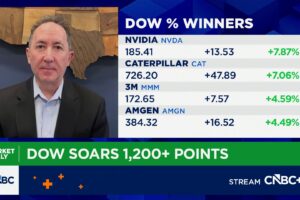
Welcome to the final month of 2022, and what a year it has been so far. This is Mark DeCambre, Editor in Chief at MarketWatch, pitching in again for our crypto reporter, Frances Yue, who will be on a much-deserved vacation for a few weeks.
So, either I or Anushree Dave, our other crypto reporter, will deliver the next few installments of Distributed Ledger. Last Thursday’s edition didn’t come out due to U.S. Thanksgiving, of course, and we’re hoping you folks all had a great Turkey, or Tofurky, Day.
We also apologize for the late start to this edition but we hope you enjoy it, nonetheless.
In any case, you can find Anushree at @Anu__Dave on Twitter (for as long as Twitter is a thing), and find me at @mdecambre. As always, find Frances at @FrancesYue_.
Quote of the week
“‘But looking at the current situation: We have a huge war going on, we have a huge financial crisis, we have FTX, we have Celsius, we have a lot of bear-market signals’”
Cops on the beat?
If anything has been made clear by the implosion of FTX, the digital-asset platform founded by Sam Bankman-Fried, it’s that regulation is sorely lacking.
As it stands now, the cops on the proverbial crypto beat are in need of clearer guidance from lawmakers.
There is, indeed, appetite for consumer protections to guard against malicious actors, who intentionally (or unintentionally, if Bankman-Fried is to be believed) do harm to investors who unwittingly (or naively) place faith in crypto characters who don’t deserve it.
At a Thursday Senate hearing, Commodity Futures Trading Commission Chairman Rostin Behnam said his agency didn’t possess the authority to look into much of FTX’s business, and said the CFTC didn’t receive any indication that FTX was a simmering problem.
The CFTC chairman put the onus on lawmakers to come up with rules to limit conflicts of interest and commingling of crypto funds. To Benham’s point, such rules exist for traditional assets, where intermingling client and the firm funds, which FTX apparently did with loosely-affiliated hedge fund Alameda Research, are prohibited.
Democratic Sen. Debbie Stabenow of Michigan, the chair of the Agriculture committee, who has teamed up with Republican Sen. John Boozman of Arkansas to promote a bill to regulate digital assets, acknowledges the difficulties of oversight.
“Because crypto assets can be used in many different ways, no single financial regulator has the expertise or the authority to regulate the entire industry,” Stabenow said at Thursday’s hearing,
The challenge, of course, is the perceived complexity of blockchain and its uses, and lawmakers’ ability to determine guidelines in a rapidly evolving area.
Cryptocurrency and its associated platforms have grown at lightning speed, with debates raging about what constitutes a security in digital-asset land. Meanwhile, there may not be a sufficiently deep understanding of how crypto works among lawmakers, beyond a recognition that bitcoin BTCUSD, -0.16%, and to lesser extent Ether, on the Ethereum ETHUSD, -0.27% blockchain, exist.
Earlier this week, Sen. Cynthia Lummis, R-Wyo., was quoted in the Financial Times as saying she hoped the collapse of FTX “highlighted with members of Congress who have not taken the time to learn more about this asset class, that it is time for them to learn more about it so we can engage in proper regulation.”
Securities and Exchange Commission Chairman Gary Gensler, who is widely seen as highly proficient in digital assets (he taught a course on it at MIT) has been adamant that the SEC is a “cop on the beat” when it comes to crypto regulation.
On top of that, he has said new rule-making isn’t necessary.
“Nothing about the crypto markets is incompatible with the securities laws,” Gensler said in prepared remarks to the Practicing Law Institute back in early September. “Investor protection is just as relevant, regardless of underlying technologies,” he said.
Notably, he offered a poignant quote to CoinDesk several months ago about his stance on crypto-lending platforms, which take collateral from clients:
“It doesn’t matter what you hand over to a platform, if you hand over gold, if you hand over bitcoin or you hand over any one of 1,000-plus alternative coins — frankly, if you hand over chinchillas. That the platform is taking those funds of value and doing something with it — they might be operating a hedge fund, they might be lending it out, they might be operating other investment schemes — but that platform is under the securities laws book because of how they’ve taken that money from you.”
But even Gensler’s approach to oversight has drawn criticism from those who question how he missed the whirling dervish that was FTX.
What remains unclear is if the apparent demise of FTX will lead to clear measures to prevent another FTX or another Celsius. Whether Bankman-Fried will be punished, at the very least for his mismanagement of his company, also stands as an open question.
See no evil
During a highly anticipated interview at the New York Times DealBook Summit in New York, Bankman-Fried, wearing a black T-shirt and looking solemn, said Wednesday he didn’t intend to commit any fraud or use customer funds to fund bets at Alameda Research, a cryptocurrency hedge fund he founded.
John J. Ray III, who is tasked with presiding over the crypto platform’s bankruptcy, described the management of the firm and its accounting as the worst he’s seen in his career.
“I didn’t know exactly what was going on,” Bankman-Fried said during his interview, which was livestreamed from the Bahamas. “I learned a lot of these things as they were going on.”
The FTX founder also was interviewed by George Stephanopoulos on Thursday on ABC’s “Good Morning America.”
“At the end of the day, it’s not my call what happens, and the world will judge as it will,” Bankman-Fried said during that interview.
He said he understood why some might view him as a villain who perpetrated a fraud akin to Ponzi schemer Bernie Madoff.
“I don’t think that’s who I am at all,” Bankman-Fried said. “But I understand why they’re saying that. People lost money. People lost a lot of money,” he said.
Crypto in a snap
Bitcoin has gained 1.9% during the past week, and was trading at around $16,982 on Thursday, according to FactSet.
Ether was up 6.5% over the same stretch to around $1,303, FactSet data shows.
Meanwhile, FTX native coins, known as FTT tokens, were down nearly 6% over the past seven days, trading at $1.29, according to data provider CoinGecko.
Crypto metrics
| Biggest Gainers | Price | 7-day return% |
| Fantom | $0.248914 | 35.6 |
| Dogecoin | $0.103244 | 26.5 |
| Huobi | $6.74 | 21.6 |
| EthereumPoW | $4.17 | 21 |
| ApeCoin | $3.91 | 18.2 |
| Source: CoinGecko as of Dec. 1 |
| Biggest Losers | Price | 7-day return% |
| BinaryX | $130.97 | -23.2 |
| Chiliz | $0.162298 | -9.1 |
| Leo Token | $3.90 | -8.2 |
| NEXO | $0.641433 | -7.3 |
| Curve DAO | $0.637690 | -7.3 |
Crypto companies, funds
Shares of Coinbase Global Inc. COIN, -1.01% are up 2.2% for the week to around $45.27. MicroStrategy Inc. MSTR, +0.45% has advanced 8.7%, at $198.98, thus far on the week.
Crypto mining company Riot Blockchain Inc. RIOT, -1.51% has climbed 3.4%, to $4.58, as of Thursday. Shares of rival Marathon Digital Holdings Inc. MARA, -1.74% were down 0.2%, at $6.21, over the past week. Another miner, Ebang International Holdings Inc. EBON, +0.82%, shed more than 4% over the past week and was trading at $4.89.
Overstock.com Inc. shares OSTK, -1.43% lost 3.4%, to $26.24, over the week.
Shares of Block Inc. SQ, +2.07%, formerly known as Square, rose 9.1%, to $69.17 for the week thus far. Tesla Inc. shares TSLA, rose 6.5% to $194.70.
PayPal Holdings Inc. PYPL, +0.15% fell 1.9% over that stretch, to trade at around $78.53. Nvidia Corp. NVDA, +1.25% rose 5.3% at $171.35 for the past week.
Advanced Micro Devices Inc. shares AMD, -0.19% surged over 3.1% to $77.48 for the week, as of Thursday.
Among crypto funds, ProShares Bitcoin Strategy BITO, -1.50% climbed 3.4% to $10.54 Thursday, while its Short Bitcoin Strategy ETF BITI, +1.46% lost 3.6% to $39.70. Valkyrie Bitcoin Strategy ETF BTF, -1.63% picked up 3% to $6.62, while VanEck Bitcoin Strategy ETF XBTF, -1.52% rose 3.6% to $16.91.
Grayscale Bitcoin Trust GBTC, -1.77% declined 1.5% to $8.89.











